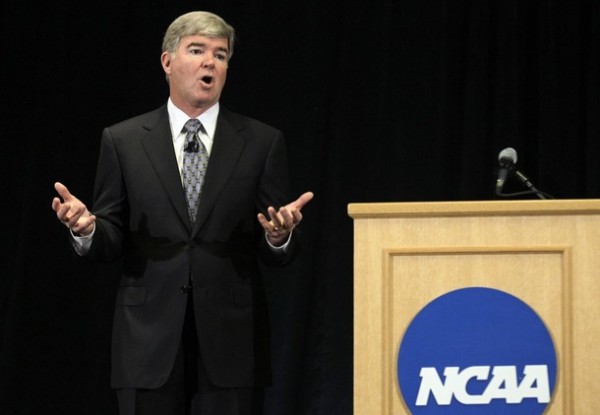NCAA Joins Pro Leagues in Challenging NJ Gambling Law, But Why?
Posted by Chris Johnson on August 8th, 2012Christopher Johnson is an RTC Columnist. He can be reached @ChrisDJohnsonn.
Since 1992, thanks to the Federal Professional and Amateur Sports Protection Act, legal sports betting in any form has only existed in four states: Montana, Oregon and Delaware have sports lotteries, while Nevada as everyone knows enjoys an entire sports booking industry. New Jersey, home to one of the nation’s most popular casino hot spots in Atlantic City, was granted a one-year time frame between 1993-94 to opt into the exclusive group, but failed to act and thus missed out on the opportunity to become the fifth member state. Governor Chris Christie sought to make up for his state’s inaction last January when he spearheaded the passage of a new law that violated the 1992 Act by legalizing gambling in his state. Christie was essentially challenging a federal law with full knowledge that a long and enduring legal battle would be waged to prevent the new state legislation. He acknowledged as much in May at a press conference in Atlantic City, saying, “If someone wants to stop us, then let them try to stop us. Am I expecting there may be legal action taken against us to try to prevent it? Yes. But I have every confidence we’re going to be successful.”

The NCAA is one of five sports league governing bodies involved in a class-action lawsuit against the state of New Jersey and its groundbreaking gambling law (Photo Credit: AP Photo/Michael Conroy)
Christie has met his day of reckoning. On Tuesday the NCAA and four governing bodies of North America’s major sports – the NHL, NBA, NFL and MLB – filed a lawsuit against New Jersey on the grounds that the state’s legislation legalizing sports gambling within its borders represents a direct threat to “the character and integrity” of sporting events and a “clear and flagrant” violation of federal law. This development comes as no surprise to Christie. He knew full well upon signing the state law of the inevitable flurry of lawsuits that would ensue, and so the governor reiterated his stance after catching word of the organizations’ actions. “I don’t believe that the federal government has the right to decide that only certain states can have sports gambling. On what basis?” he said.
The lawsuit is primarily concerned with maintaining the idyllic standard of “honest athletic competition,” hoping to eliminate any suspicion that the outcomes of games are being influenced by common gambling plays like wagers on point spreads and final scores. The only problem with that logic is that professional and college sports have been inextricably linked to gambling for decades, including in states where wagering on athletic competition is already forbidden under federal law. Point shaving and the potential alteration of outcomes will always exist because sports betting, despite the powers residing within the 1992 federal law, is as commonplace for fans as any game day hobby, irrespective of location. Online gambling sites requiring nothing more than a credit card number have opened up the practice to most age levels. Newspapers publish betting lines and point spreads to facilitate easier access to essential sports wagering information. Sports bars nationwide promote NFL Sunday prop bets with gambling notes laid bare for any and all customers to access with minimal restrictions. Trying to police or criminalize such a widespread practice is nonsensical. And yet federal statutes limit its legal existence to four states, leaving untapped a potential windfall in tax revenue. Lawmakers aim to weed out sports gambling by limiting its practice yet in the same breath ignore the widespread existence of illegal and unregulated wagering nationwide. The sheer hypocrisy of their actions is off the charts.
The government’s misguided logic is one thing – and at this point no federal lawsuits have been filed against Christie’s law. The four major sports’ concerns about preventing sports wagering are another matter entirely. Believing that legalized sports gambling would harm the integrity of competition – “the sponsorship, operation, advertising, promotion, licensure and authorization of sports gambling in New Jersey would irreparably harm amateur and professional sports,” the lawsuit states – ignores the fact that wagering on games is an everyday practice that has and will continue to take place, regardless of whether federal or state statute dictates otherwise. For many fans, Betting and other activities such as funded fantasy sports leagues have become part and parcel with the game day experience. While point shaving or other breaches of athletic integrity would still exist in a legalized gambling landscape, those dishonorable practices can and do take root just as easily under today’s prohibitive gambling regulations. If Christie prevails, and other laws are passed nationwide, professional or amateur sports would not be affected by sports betting any more than they already are today.












































